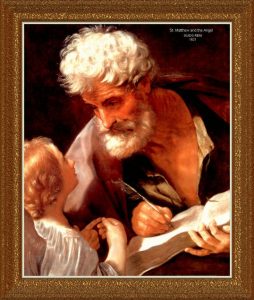9/21 FEAST OF SAINT MATTHEW APOSTLE AND EVANGELIST

September 21, A.D. 2017 – Saint Matthew Apostle and Evangelist
Calendar for the Traditional Roman Rite
Matthew the tax-collector and Levi are the same person. The name Matthew, which he received after the call from Jesus, means “Gift of God”. We do not know when or why the Lord gave him the name by which he is now best known in the Church. Out of respect for their fellow apostle, neither Luke nor Mark mentions Matthew’s profession, because taxcollectors were hated. Matthew himself, however, reports that the Lord “saw a man called Matthew, sitting at the taxbooth”, that is a man already known as Matthew. As Saint John Chrysostom notes: “The apostle is deserving of admiration for not concealing his former life, and also giving his name, which the others concealed with another appellation”. The apostle does not deny his former life, but acknowledges his alteration after being called. This demonstrates his humility.
Matthew lived in Capernaum, a of Herod. As a clerk, he would have been in the service of some larger employer who had paid the tax revenues of the city, or even the region, to the Romans and then had the right to keep whatever monies he had raised. Matthew would certainly have known the Aramaic spoken by the Jews in the area, and Greek as well. When the Lord said: “Follow me”, he left immediately, abandoning everything without hesitation This indicates that he already knew and respected the Lord. He, too, belonged to the tax-collectors who approached the Lord and concerning whom the Pharisees condemned Him for being “a friend of tax-collectors” (Luke 7, 35; 15, 1). Matthew must have been a rich man.
This is apparent from the fact that he had his own house. It was there that, to celebrate his call and the abandonment of his profession, he gave a farewell meal, to which he invited a good many people.
Apostle Matthew. Manuscript from Sinai, 12th Century :After his call, he was not prominent among the circle of disciples. Not when the Lord was alive, nor after the resurrection. His name is not mentioned anywhere in the New Testament . This was almost certainly because of his humility. Clement the Alexandrian provides us with details of his strictly ascetic life: “ For the Apostle Matthew ate cereals, nuts and vegetables, without meat”.
After the Lord’s resurrection, Matthew preached Christ for about eight years to the Jews. It was here that, between 60-66 A.D., he wrote the Gospel, originally in Aramaic, and then either translated it himself or had it translated into Greek It contains narratives of the events in the life of the Lord and also teachings which He used in His catechesis. Irinaios is the first to mention that “the Gospel according to Saint Matthew was written to the Jews”.
The purpose behind the writing of the Gospel of Saint Matthew was to make manifest that Christ came “from the seed of Abraham”, which is why the narrative begins with His nativity. As Saint John Chrysostom says: “He wanted nothing more than to show that He was of the seed of Abraham and David… for nothing would soothe a Jew so much as to know that Christ was the descendant of Abraham and David”. This is why he selects important events in the life of Christ, compiles His sayings and presents them in such a way that they demonstrate that Jesus Christ is, indeed, the Messiah Who was foretold for the Jews. By quoting the prophecies of the Old Testament, he makes it clear that they were fulfilled in the person of Christ. Saint Nikodimos the Athonite declares that: “later he was put to death by fire by the infidels”, in Ierapolis, in Syria. It may be that this is confirmed by a verse in his Life: “‘Jesus You also save taxcollectors; grace belongs to You’. This is what Matthew cried, when he was in the midst of the fire”. By the prayers of Your apostle, God, have mercy upon us. Amen.
Permanent link to this article: https://luisapiccarreta.com/921-feast-of-saint-matthew-apostle-and-evangelist/

